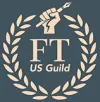FT US Guild Frequently Asked Questions
What are our priorities?
- Pay transparency and fairness
- Workload and understaffing
- Employment stability, severance guarantees and temporary contracts
- Diversity
What can a union do for us?
Unionizing gives us collective power to negotiate with management for better, fairer working conditions. It can also protect and support us in case of organizational upheavals such as mass layoffs or a change in ownership.
A union can help us formally secure items like minimum pay, severance, pay raises, pay and contract transparency, transparency and diversity in hiring.
Unionizing gives us the right to negotiate with management for better, fairer conditions. All of our working conditions, like pay, raises, severance and the way we perform our work can be defined into a legally binding agreement with the company. It can also protect and support us in case of organizational upheavals such as mass layoffs or a change in ownership.
Organizing will also enable us to fight unilateral changes to our working conditions, layoffs, and unfair or unequal treatment.
Who can belong to the union?
All non-supervisory US employees have the right to form a union. Federal labor law does not protect those who have hiring or firing authority, or who have access to confidential company information. We are seeking to include as many people as possible.
Will unionizing erode our collegial relationship with management?
No. We seek to improve our relationship with management through establishing a fair and transparent workplace where we can do the best work possible. We want to unionize to legally lock down the benefits we currently have, to secure greater pay transparency and fairness, and to address other workplace issues. We think the best time to do so is now, while the FT is led by executives who respect employees. Management and owners change, but the contract we secure today will protect journalists in the future.
Aside from bargaining, what will our union do?
- Maintain good communication between FT colleagues
- Enforce of our rights and collectively negotiated agreement
Assist colleagues to resolve issues in on ongoing way - Interact productively with management to plan around changes to workflow and other novel arrangements
What are the next steps?
Participate in building our union. Organizing is a powerful process through which we are establishing our collective vision and securing our futures and the future of the Financial Times. When we are ready to win a union election through the National Labor Relations Board by a decisive supermajority, we’ll ask the company to recognize our union. FT Specialists were able to achieve this, so we are optimistic. If the company refuses, we’ll file authorization cards with the board to begin that election process.
Once we have our union formally in place, we’ll build our collective vision for our contract, and the plan to win it. We’ll form a bargaining team to negotiate with the company, and once a deal is reached, it will go to union members for a ratification vote.
Reference links
